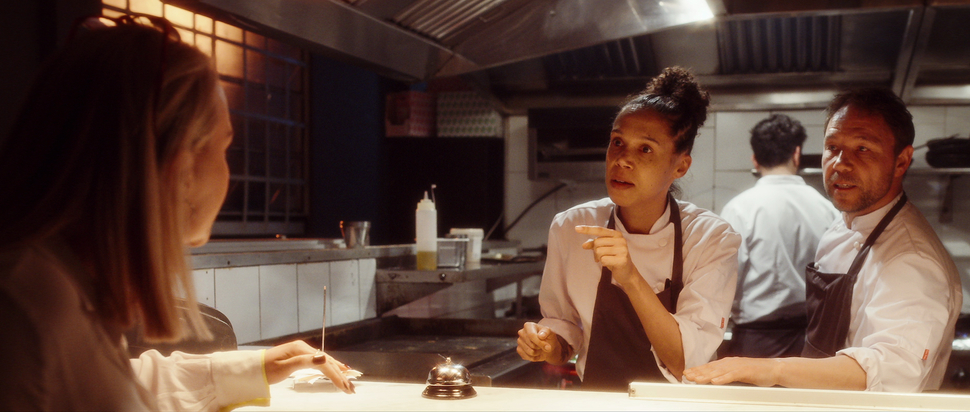The making of one-shot restaurant thriller Boiling Point
Actor Philip Barantini makes a splash behind the camera with the breakneck restaurant thriller Boiling Point, which was filmed in one shot in a real London eatery. He discusses the tension of the long take and trying to complete the film before lockdown
“I was in a hotel this morning” – Philip Barantini doesn’t mention the reason he was there, but his restaurant drama, Boiling Point, had picked up four awards at the British Independent Film Awards the previous night – “and I was watching the guys at breakfast. And they run. Everyone runs around. And that’s what I want to achieve with this. Everyone’s on the same train going in the same direction and you can’t get off. Including the audience.”
Watching Boiling Point, it’s impressive how rarely Barantini turns down the heat. From the start, we watch Andy (Stephen Graham), the head chef of a trendy London restaurant, struggle to stop his personal troubles affecting his professional demeanour. Everyone has to sideline all their own problems as the restaurant opens up for the busiest night of the Christmas season, where the staff are undervalued and the customers obnoxious. Never has a kitchen been more nightmarish, but it’s made all the tenser by the fact that the drama is captured in one continuous shot.
In expanding his 2019 short (also one shot and starring Stephen Graham), Barantini’s intention wasn’t to impress the audience but to keep them in the moment. “We wanted to add that layer of tension,” Barantini explains. “We didn't want it to be a show-off thing. Because when you’re in a busy service, it is one take; you don’t get the chance to stop for 20 minutes and have a chat.” The audience feels like they’re constantly fighting to keep up, pulled in various directions by every hospitality horror story that crops up.
Boiling Point walks a tightrope of tension, never overwhelming or disengaging the audience, a challenge Barantini engaged with at every turn. “We had the idea of having a score in there, and having it composed,” he says. “To see if we could add to that tension, and what it actually did was it took away from the tension.” Barantini found he could mine drama in less obvious ways. “I think tension, for me, comes in those quieter moments when you’re not sure what’s going to happen.” By showcasing more muted, delicate moments of conflict, he says, “You’re sort of drawn into it, aren’t you? All your senses are open and ready.”
It’s remarkable that every beat feels authentic. Barantini has a 12-year history of working in the culinary world (including a stint at Jones & Sons, the Dalston eatery in which Boiling Point was filmed), and so has a wealth of stories to draw from. But after coming up with a list of anecdotes with co-writer James Cummings that served as the script’s skeleton, Barantini turned to the cast. “We workshopped it with the actors, and that’s when the dialogue came in,” he says. “And once they did the dialogue among themselves and we worked on it a bit, then we wrote that dialogue into the script. Even after that, I said to the actors, 'I don’t want you to be tied down to those specifics.'”
This approach was crucial for incorporating a diverse range of perspectives in the film, such as the racist aggressions aimed towards Andrea (Lauryn Ajufo), a Black waitress, from a vexatious customer. “That was important for me to sit down with [Ajufo], and we chatted through it and we did some research, and I was educated on that from her for a period. Three hours worth of chat, it was an incredibly emotional three hours.”
But it’s not to say all his characters get a nice, neat ending. In fact, Barantini deliberately eschewed traditional resolutions for each member of his ensemble. “You decide to do a one-take film, you’ve got parameters, you’ve got a certain amount of time to leave it up to the audience to think about it, and have that feeling of ‘Ahh, I wish I could figure out how he’s doing, or how she’s doing.’ That’s what I wanted to get from it.”
The production was not without its real-life tension; it was one of the UK’s last productions to wrap before the COVID-19 outbreak in the UK in March 2020. The planned shoot was four nights, filming two attempts per night, but they ended up having only half that time to get it in the bag. The third attempt is what makes up the film.
“And looking back now, I wondered if we’d done six more takes, whether we’d have overdone it,” Barantini shares. “Overplanned or the actors would have been overacting or overthinking it. So you just think if it was meant to be. Think positively, right?” With a success like Boiling Point under his belt, thinking positively won’t be too hard.
Boiling Point is released 7 Jan by Vertigo
